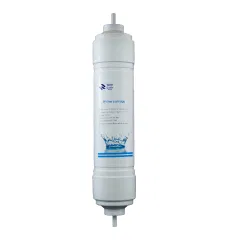Choosing the Right Water Filter for Your Home: A Beginner's Guide
2024-09-21
With so many different water filtration systems available on the market, choosing the right water filter for your home can feel overwhelming. From pitcher filters to under-sink systems, each type offers different levels of filtration and convenience. In this guide, we’ll break down the various types of water filters and help you determine which one is best suited for your household’s needs.
1. Pitcher Filters: Simple and Portable
Pitcher filters are one of the most common and affordable types of water filtration systems. These filters work by passing tap water through an activated carbon filter, which removes impurities such as chlorine, sediment, and some heavy metals. The filtered water is then stored in the pitcher, ready for drinking or cooking.
Pitcher filters are ideal for small households or individuals who want a simple, portable solution. They are easy to use, require minimal maintenance, and don’t require installation. However, they have a limited capacity and may need to be refilled frequently if you use a lot of water.
Best for: Small households, renters, or those who need a portable, budget-friendly option.
2. Faucet-Mounted Filters: Easy Installation
Faucet-mounted filters attach directly to your kitchen faucet and provide filtered water on demand. These filters typically use activated carbon to remove contaminants such as chlorine, lead, and some volatile organic compounds (VOCs). They are a step up from pitcher filters in terms of capacity and convenience, as you can filter water directly from the tap without needing to refill a pitcher.
Faucet-mounted filters are easy to install, usually requiring no special tools or professional assistance. However, they may reduce water flow slightly, and the filter cartridges will need to be replaced regularly.
Best for: Medium-sized households or those looking for a convenient, easy-to-install solution without major changes to their plumbing.
3. Under-Sink Filters: High-Capacity Filtration
Under-sink water filters are installed directly under your kitchen sink and provide filtered water through a separate faucet or directly from the main tap. These systems are highly effective at removing a wide range of contaminants, including chlorine, lead, mercury, pesticides, and more. Some under-sink filters also use reverse osmosis technology, which can remove up to 99% of contaminants.
While under-sink filters require more complex installation than faucet-mounted systems, they offer the advantage of higher filtration capacity and faster water flow. They are a great option for households that use large amounts of water and want a long-term solution for water purification.
Best for: Larger households or those looking for high-capacity, comprehensive filtration.
4. Reverse Osmosis Systems: Advanced Purification
Reverse osmosis (RO) systems are among the most advanced water filtration systems available. They work by forcing water through a semi-permeable membrane that filters out contaminants, including heavy metals, bacteria, viruses, and even dissolved salts. RO systems are typically installed under the sink and can provide extremely clean, purified water.
While RO systems offer the highest level of filtration, they can be more expensive and may produce wastewater as a byproduct. The installation process can also be more involved, but the long-term benefits of exceptionally pure water make it worthwhile for many households.
Best for: Households that need the most thorough filtration, especially those in areas with poor water quality or specific health concerns.
5. Whole-House Water Filters: Comprehensive Solution
Whole-house water filters are designed to filter all the water that enters your home, ensuring that every faucet and showerhead provides clean water. These systems are installed at the point of entry for your water supply and can filter out sediment, chlorine, and other contaminants. Some whole-house filters also include additional stages of filtration, such as UV sterilization, to kill bacteria and viruses.
While whole-house filters offer the most comprehensive solution, they are also the most expensive and require professional installation. However, they are ideal for households concerned about not just drinking water, but also water used for bathing, cooking, and washing clothes.
Best for: Large households or those looking for an all-encompassing water filtration system.
Conclusion
Choosing the right water filter depends on your specific needs, budget, and household size. Whether you’re looking for a simple pitcher filter or a high-capacity reverse osmosis system, there’s a solution to fit your lifestyle. By understanding the different types of water filters and their benefits, you can make an informed decision and ensure that your family has access to clean, safe water for drinking, cooking, and more.



